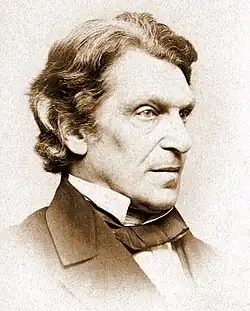James Martineau

James Martineau (April 21, 1805 – January 11, 1900) was an English philosopher.
Quotes
Hours of Thought on Sacred Things (1879)
- Hours of Thought on Sacred Things. London: Longmans, Green, Reader, & Dyer, 1879
- Trust arises from the mind's instinctive feeling after fixed realities, after the substance of every shadow, the base of all appearance, the everlasting amid change.
- Vol. II, p. 5.
- This it is that gives a majesty so pure and touching to the historic figure of Christ; self-abandonment to God, uttermost surrender, without reserve or stipulation, to the guidance of the Holy Spirit from the Soul of souls; pause in no darkness, hesitation in no perplexity, recoil in no extremity of anguish; but a gentle unfaltering hold of the invisible Hand, of the Only Holy and All Good; — these are the features that have made Jesus of Nazareth the dearest and most sacred image to the heart of so many ages.
- Vol. II, pp. 14–15.
- There is no room in the universe for the least contempt or pride; but only for a gentle and a reverent heart.
- Vol. II, p. 23.
- From the moment of his self-dedication, when he threw His cares away, and went forth not knowing where to lay his head, the whole energy which others spend on interests of their own was poured into his humane and divine affections, and filled his life with an enthusiasm resistless and unique. However quiet his words, it is impossible not to feel the tender depths from which they come.
- Vol. II, p. 31.
- To him let us but cleave in all our strife; and the Tempter will flee; the wilderness will be desolate no more; angels will come and minister unto us; and when we pass thence to the ministry of life, be it to the glory of a transfiguration, the sorrows of a Gethsemane, or the sacrifice of the cross, the tranquillizing peace of God will never be far from us.
- Vol. II, p. 49.
- One thing alone my heart requires, — one gleam of living light amid the ashes and the gloom; that, while my penance is worked out, the face of God should not be turned away; that into my cell of humiliation the flood of divine pity should break, and keep aglow the openings of eternal hope, and sustain the hidden strength of an everlasting love.
- Vol. II, p. 62.
- It was in his parting sorrow that Jesus asked his disciples to remember him; and never was entreaty of affection answered so; for ever since has his name been breathed in morning and evening prayers that none can count, and has brought down some gift of sanctity and peace on the anguish of bereavement, and the remorse of sin.
- Vol. II, pp. 125–126.
- Human character is never found "to enter into its glory," except through the ordeal of affliction. Its force cannot come forth without the offer of resistance, nor can the grandeur of its free will declare itself, except in the battle of fierce temptation.
- Vol. II, p. 126.
- If it is permitted to the enlightened but baffled Statesman, when deserted and fallen from his place, to appeal from the voices of the moment to the judgment of more impartial times, with what right can we call in question the loftier form of the same prophetic trust which looks to a present God rather than to future men?
- Vol II, pp. 189–190.
- The secret belief that the Lord of conscience loves and accepts each faithful sacrifice is the ultimate and sufficient support of all goodness; dispensing with the chorus of approving voices; replacing all vain self-reliance with a Divine strength; and with the peace of a reconciled nature consoling the inevitable sorrows of a devoted life.
- Vol. II, p. 190.
- All spiritual strength for ourselves, all noble ties to one another, have their real source in that inner sanctuary where God denies his lonely audience to none. Its secrets are holy; its asylum, inviolate; its consolations, sure; and all are open to the simple heart-word, "Thou art my hiding-place."
- Vol. II, p. 253.
- When the blessed Spirit, that bloweth where it listeth, visits you and stirs the plumage of the soul, seek no cowardly shelter from it, but fling yourself upon it, and, though its sweep be awful, you shall be sustained. Only do this, do all, not in presumptuous daring, but in divine submission; in dependence, not on any strength that can be spent, but on the ever-living stay of all that trust in him.
- Vol. II, pp. 284–285.
- We cannot embrace his cross, and yet refuse our own. We cannot raise the cup of his remembrance to our lips, without a secret pledge to him, to one another, to the great company of the faithful in every age that we too hold ourselves at God's disposal, that we will ask nothing on our own account, that we will pass simply into the Divine hand to take us whither it will.
- Vol. II, p. 367.